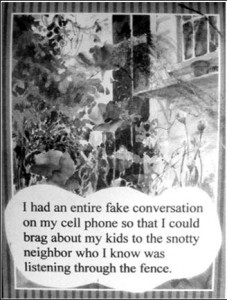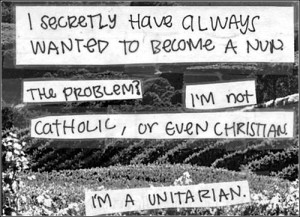Not as Alone as You Think You Are
January 1, 2016Podcast: Download (Duration: 10:11 — 9.3MB)
Subscribe: More
 So, here’s a question to get us started: Who do you tell your secrets to? Now, don’t go and say you don’t have any secrets. Because that’s just not true; everyone has secrets. Everyone does. Maybe your secrets are things you’ve done in your life, or things that happened to you that you don’t want to share. Maybe they’re things you’ve thought or felt in the privacy of your own mind and that’s where you want to keep them.
So, here’s a question to get us started: Who do you tell your secrets to? Now, don’t go and say you don’t have any secrets. Because that’s just not true; everyone has secrets. Everyone does. Maybe your secrets are things you’ve done in your life, or things that happened to you that you don’t want to share. Maybe they’re things you’ve thought or felt in the privacy of your own mind and that’s where you want to keep them.
Dreams and fears, joys and pains, wonderings, wanderings, loves and heartaches—we all have secrets.
So, again, the question: Who do you tell your secrets to? A best friend? Your sister? Your dad? Your minister? Your therapist? Your spouse? Your God? If you are like me, you probably spread them out a little—some to colleagues, some to friends, some to loved ones, some to professional listeners of one kind or another. And some, I’m sure, you keep to yourself.
The telling of secrets—and the receiving of them—has long been a religious function. People told their secrets to a religious official, or to a religious icon, to a god or to a community of faith. And religions have often thought about what to do with those secrets: Do we say, “You are forgiven and free”? Do we say, “Okay, now you must do this or that”?
In recent years, millions of people have found a surprising way into that sacred function of sharing secrets. A man named Frank Warren, who lives in suburban Maryland, started an art project. He handed out postcards and said, write down a secret and send it to me.
The idea spread. Now he receives thousands of secrets every year. Every Sunday, Frank posts about a dozen postcards to his website, postsecret.com, and millions of people around the world go to see them. For some, it is entertainment or voyeurism. For many, it is a religious act, a way to remember the most lucid secret: that all our loneliness is just an illusion.
Secrets can be a little fun, sometimes. They can be exciting to have and exciting to tell. Exciting to invent, even. But they can also be very painful. Our secrets can be shameful. Those at Postsecret are no different. There are many secrets about sexuality. Affairs, fantasies that “you are not supposed to have,” ways in which people have been hurt or have hurt others. There are secrets about body image, eating disorders, illness, poverty and other things which make some folks feel ashamed.
Other secrets are about families, about what happened to our ancestors, about what they did or didn’t do, or what they had done to them. Secrets can arise from a divided sense of loyalty. We are often, for instance, loyal to our parents, and we want to respect them, so we don’t talk out of school about them, don’t tell their secrets, even if, sometimes, telling or even just acknowledging them honestly to ourselves would
heal old wounds and allow us to move forward.
There are a lot of secrets about folks who don’t feel like they fit in. Call it self-image, or social respectability, or an inability to color within the lines. Folks confess to doing things to make themselves seem more “normal.” Sometimes we humans make excellent peacocks, displaying all our colors for the sake of others. But it’s not real, is it? There are so many secrets about folks not quite fitting in, and hiding it, that you pretty quickly realize that really, nobody fits in perfectly. There is no normal.
And when we can’t be honest, when we act high-and-mighty, this makes it hard for others to connect with us. We distance ourselves from others. Everyone has doubts, and nobody’s perfect. The question is, can we admit it?
Sometimes the secrets are about folks realizing that they might not be on the right path. We are told, or we think, that if we do X then we’ll be happy. And when doing X doesn’t live up to expectations, this can be very confusing. Cognitive dissonance, it’s called. Many of the comments shared on Postsecret fall into this category, whether about relationships, geography, or professional lives. It seems that a lot of folks are in jobs or careers that they are not really sure about. Even folks who are supposed to be following their bliss sometimes discover that it turns out not to be as blissful as they thought.
Secrets reveal the bankruptcy of stereotypes. We have desires, hopes and dreams, yet we feel ambivalent, afraid or ashamed about sharing them. The parts of our lives don’t always make sense together, and so we train ourselves to reject part of who we are because being our full self confounds others. It even confounds us.
It takes courage to tell a secret. And yet it can be liberating. To just say it aloud can be a breath of fresh air. Even if we say it to nobody we know, even if it goes anonymously into the mail and never gets posted anywhere, the act of speaking or writing our secret can free us from some of the pain about it.
What is clear from the secrets on the postsecret.com website is that folks who can honestly see themselves in the mirror, who understand themselves well, have fewer regrets. Not no regrets. But fewer. Sometimes regrets aren’t about what we did, but about what we didn’t do. Like regrets about the secret we didn’t speak until it was too late.
Now, it is clearly not appropriate for us to tell every secret to every person we meet. Sometimes, the best course of action is to keep quiet. We should not betray confidences. Sometimes we think our loved ones are about to make a big mistake, but the best thing we can do is just support them, as a friend, so that we’re still there for them when they figure it out, too.
But there are times we should speak up. Yes, I sent the flowers. I love you. Yes, I want to change how things are. Yes, I’m hurting and need help..
Some secrets simply have to be told. As a society we are beginning to see how abuse thrives in a culture of secrecy. A lot of our world has finally shifted toward understanding that secrets about child abuse are not okay, that children should tell a trusted adult, that religious communities need to be honest about what they know, that we don’t keep these kinds of secrets anymore. Cover-ups and such lies have been declared dangerous and illegal. To protect others, some secrets have to be told, hard as it is to do so.
A big part of telling our secrets is learning how not to be afraid. Many of our secrets are about things that frighten us, although we don’t think they should.
 But more than anything else, the secrets on Postsecret speak to the paradox of loneliness. Many people share their secrets with Frank Warren because they don’t have anyone else to share them with. But Postsecret isn’t always just a one-way communication. Folks write to Frank and ask him to pass along messages, to share so that others can find themselves in a secret that is held in common. The secret sharer, anonymously through the website, is congratulated, affirmed in their struggle, prayed for and loved and told, I’ve been where you’ve been. And the reader just might find their own life reflected in a postcard-sized story, and know that they are not alone.
But more than anything else, the secrets on Postsecret speak to the paradox of loneliness. Many people share their secrets with Frank Warren because they don’t have anyone else to share them with. But Postsecret isn’t always just a one-way communication. Folks write to Frank and ask him to pass along messages, to share so that others can find themselves in a secret that is held in common. The secret sharer, anonymously through the website, is congratulated, affirmed in their struggle, prayed for and loved and told, I’ve been where you’ve been. And the reader just might find their own life reflected in a postcard-sized story, and know that they are not alone.
We each carry a secret fear: that no one is like us, that no one will understand. But the real secret is exactly the opposite: our loneliness is just an illusion. These moments of connection remind us that we are not alone in this world. As a minister, I’m sworn to keep identities private, and I do. But I can’t tell you how many times someone has told me their story and finished with, “I’m sure I’m the only one who…” And I respond: “No, I’ve heard stories just like yours before. You are not the only one. You are not alone.”
Not all our secrets are heartbreaking or painful, or about not fitting in. Sometimes the secrets that get sent in to Postsecret are happy secrets. Joy that bursts through. Sometimes that joy seems so profound that it feels secret, because we don’t know that anyone can understand, or because we don’t want to brag or rub it in. Sometimes secrets warm the heart. They remind us of what matters, what’s real. In a world of illusion, some secrets show us the truth. Sometimes secrets are about changing our assumptions, making a new beginning.
Who do you tell your secrets to? I hope you have someone, or a few folks. Even if it is in a journal or a postcard in the mail, I hope that you have a place to share, to know that others care about you in your fullness. The parts of ourselves that we keep secret are complicated. They don’t quite fit, and we don’t always know what to do with them. But guess what? Neither does anyone else.
 The answers to life don’t come on a postcard, and nobody’s life is one-dimensional. No matter our age or how smart we think we are or our religion or anything else, we’re all just trying to figure it out. Actually, this makes me happy. It means there is space for discovery. It means that we can cross the distance between us. It means that we need one another, and can be friends.
The answers to life don’t come on a postcard, and nobody’s life is one-dimensional. No matter our age or how smart we think we are or our religion or anything else, we’re all just trying to figure it out. Actually, this makes me happy. It means there is space for discovery. It means that we can cross the distance between us. It means that we need one another, and can be friends.
Share what you need to share. Listen when someone wants to share with you. Hold the secrets of others with tender love. Hold one another with tender love. We are all human; we are all complicated; we are all beautiful. We’re all trying to figure it out together.
And that might just be the secret of life.
Matthew is a third-generation Unitarian Universalist. He grew up in the Seattle, WA area, where he enjoyed church, the woods, and daydreaming. He has a eight-year-old daughter, Rosalie, and a five-year-old son, Leo.
When he's not at church, Matthew spends time running along the Rock River, playing with the kids, reading, rooting for the Packers, and enjoying local beer.
Matthew is focused on the good news of Unitarian Universalism. "This is a religion," he says, "which can save lives and the world. People seek a spiritual path that integrates their whole selves, that inspires awe, that celebrates beauty, and grounds justice. We can offer a vision of the good life, and the tools to make it real." Matthew is passionate about welcoming newcomers to church, building strong communities, the preaching life, and working in accountable and effective ways for justice among all creation.
- A Renewal of Faith - April 1, 2020
- Not as Alone as You Think You Are - January 1, 2016
Quest Monthly Print Edition
Recent Issues
Latest Spiritual Reflection Posts
Weekly Newsletter
About
Quest for Meaning is a program of the Church of the Larger Fellowship (CLF).
As a Unitarian Universalist congregation with no geographical boundary, the CLF creates global spiritual community, rooted in profound love, which cultivates wonder, imagination, and the courage to act.
Contact
Church of the Larger Fellowship Unitarian Universalist (CLFUU)
24 Farnsworth Street
Boston MA 02210

